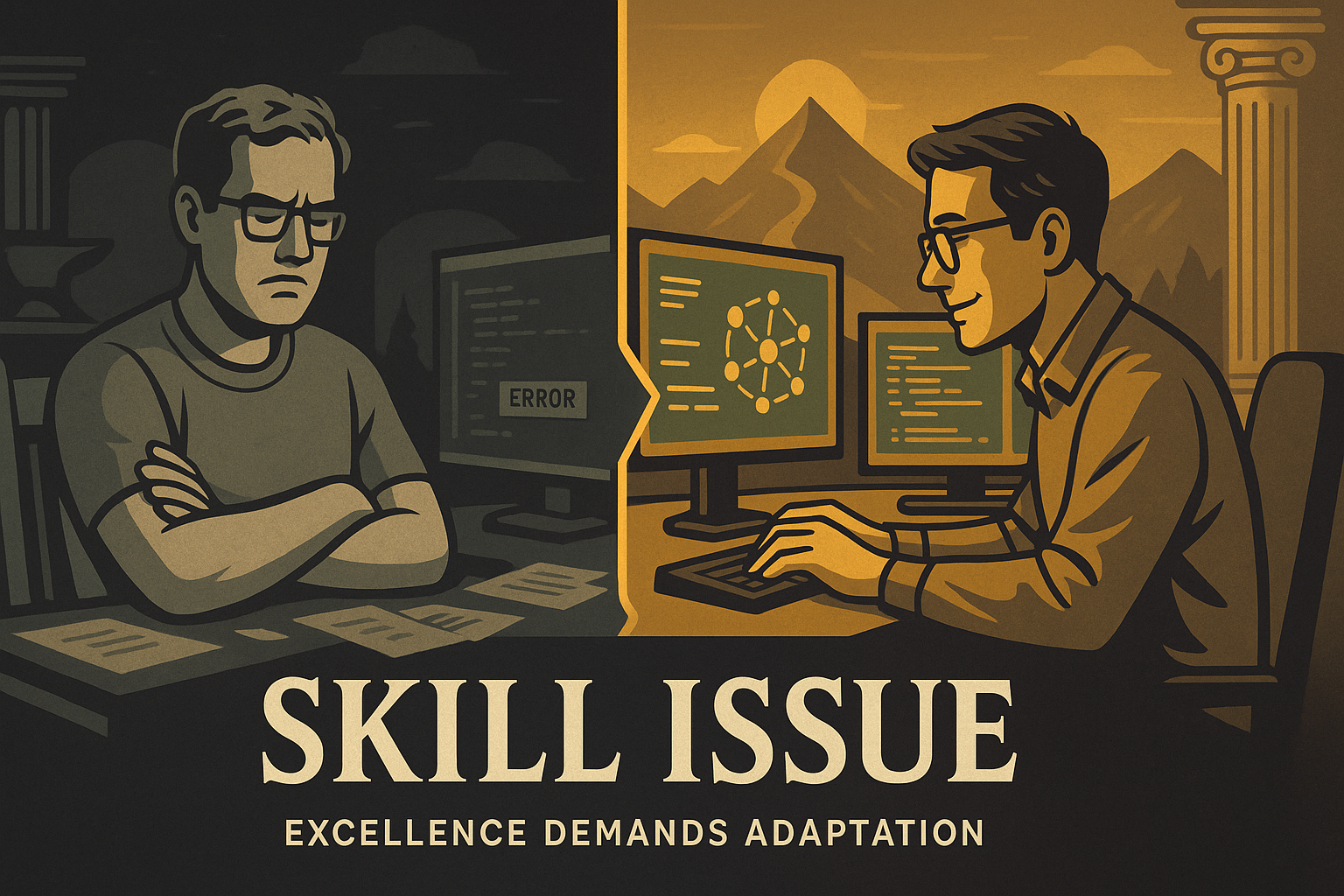
The Skill Issue: Why Engineers Who Dismiss AI Won't Make It
By Derek Neighbors on June 11, 2025
The AI Excellence Gap
Navigate the AI revolution with practical wisdom and strategic thinking
I just watched a thread that perfectly encapsulates why some engineers are going to get absolutely demolished in the next few years.
A senior engineer tried using Claude 4 for a JRuby optimization. Got “copypasta garbage.” Spent an hour, gave up, claimed it would take him 30 minutes to do it himself. The thread devolved into a circle-jerk of engineers agreeing that AI “only works for JavaScript” and produces “crap code.”
Here’s what I see: A massive fucking skill issue.
The 4-Minute Mile Problem
Imagine you’re a runner. You consistently run 8-minute miles. Someone gives you new shoes and tells you they’re helping people run 4-minute miles. You try them, run a 7:50, and declare the shoes “garbage” because you didn’t hit 4 minutes.
Meanwhile, other runners are posting 4-minute miles with the same shoes.
The problem isn’t the shoes.
This is exactly what’s happening with AI and engineering. While some engineers are achieving 10x productivity gains, others are getting marginal improvements and concluding the tool is broken.
The Excellence Gap
The engineers dismissing AI effectiveness aren’t revealing AI’s limitations, they’re revealing their own. Specifically, their inability to:
1. Learn New Interaction Patterns
AI isn’t a better Google. It’s not a smarter autocomplete. It’s a fundamentally different way of working that requires developing new skills.
The engineers getting “copypasta garbage” are likely:
- Asking vague questions
- Providing insufficient context
- Not iterating on prompts
- Expecting magic without mastery
2. Embrace Beginner’s Mind
Excellence requires the humility to be bad at something new. These engineers are so attached to their existing expertise that they can’t tolerate the discomfort of learning.
They’d rather dismiss the tool than admit they need to develop new capabilities.
3. Recognize Paradigm Shifts
“It only works for JavaScript” reveals a fundamental misunderstanding. AI effectiveness isn’t about the language, it’s about the engineer’s ability to:
- Communicate requirements clearly
- Provide relevant context
- Guide the AI’s reasoning process
- Iterate and refine outputs
The Arete Response
arete demands we pursue excellence in all dimensions, including adaptation to new tools and methods. When faced with a tool that others are using effectively, the excellent response isn’t dismissal, it’s investigation.
Questions of Excellence:
- “What are the top performers doing differently?”
- “How can I improve my approach?”
- “What skills do I need to develop?”
- “Where are my assumptions limiting me?”
Questions of Mediocrity:
- “This tool is garbage”
- “It only works for simple stuff”
- “I can do it faster myself”
- “The training data is bad”
The Real Skill Issue
The skill these engineers are missing isn’t technical, it’s meta-cognitive. They lack:
Learning Agility
The ability to quickly acquire new capabilities and adapt to changing environments.
Pattern Recognition
Seeing that when multiple high-performers achieve results you can’t, the variable is likely you, not the tool.
Intellectual Humility
Recognizing that your current approach might not be optimal and being willing to experiment.
Systems Thinking
Understanding that AI effectiveness depends on the entire interaction system, not just the tool itself.
The Coming Separation
We’re witnessing the early stages of a massive separation in the engineering field. On one side: engineers who embrace AI as a force multiplier and develop the skills to use it effectively. On the other: engineers who dismiss it and continue working the old way.
The gap will compound exponentially.
The AI-enhanced engineers will:
- Ship faster
- Explore more solutions
- Learn new domains quickly
- Solve previously intractable problems
The AI-dismissive engineers will:
- Fall further behind
- Become increasingly irrelevant
- Blame external factors for their stagnation
- Eventually be replaced by those who adapted
The Path Forward
If you recognize yourself in this thread, here’s your path to excellence:
1. Acknowledge the Gap
Stop making excuses. If others are getting better results, assume you have something to learn.
2. Study the Masters
Find engineers who are effectively using AI. Study their approaches. Ask questions. Swallow your pride.
3. Practice Deliberately
Treat AI interaction as a skill to develop. Start with simple tasks. Build complexity gradually. Measure your improvement.
4. Embrace the Discomfort
You will feel stupid initially. You will produce garbage outputs. This is the price of learning something new.
5. Iterate Relentlessly
AI effectiveness comes from iteration. Your first prompt won’t be perfect. Your tenth might be transformative.
The Choice
You have a choice right now:
Path A: Dismiss AI as overhyped. Continue working the old way. Gradually become irrelevant as others lap you.
Path B: Recognize this as a skill gap. Commit to developing AI interaction capabilities. Join the ranks of exponentially more productive engineers.
The choice reveals your character.
Excellence demands we adapt to new realities, not cling to comfortable limitations. The engineers in that thread aren’t protecting their craft, they’re abandoning it.
The future belongs to those who embrace the discomfort of learning and the humility of beginner’s mind.
Which engineer will you be?
Final Thought
Stop reading about AI effectiveness and start measuring it.
This week, pick one task you normally do manually. Spend 30 minutes learning to do it with AI assistance. Track the time, quality, and your frustration level.
Then ask yourself:
“Am I getting better results, or am I making excuses?”
The engineers who will dominate the next decade aren’t the ones with the best technical skills today. They’re the ones with the best learning skills.
Your skill issue isn’t with the code. It’s with the courage to be bad at something new.
For systematic frameworks on building AI fluency and adaptation advantage, explore MasteryLab.co or join my newsletter for weekly insights on thriving in the AI age.



